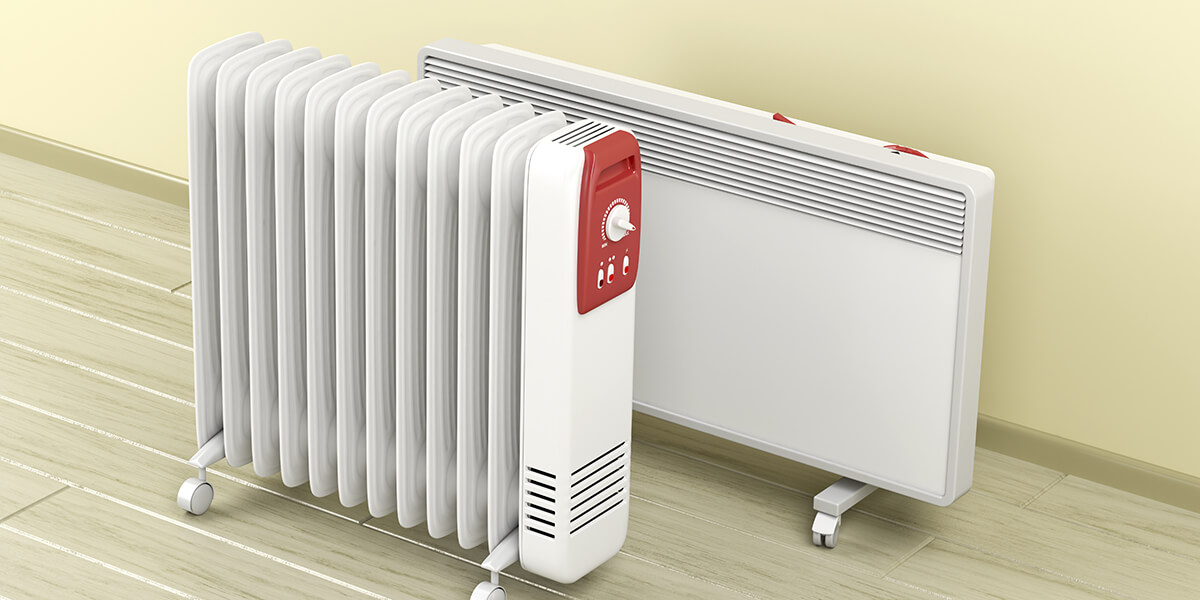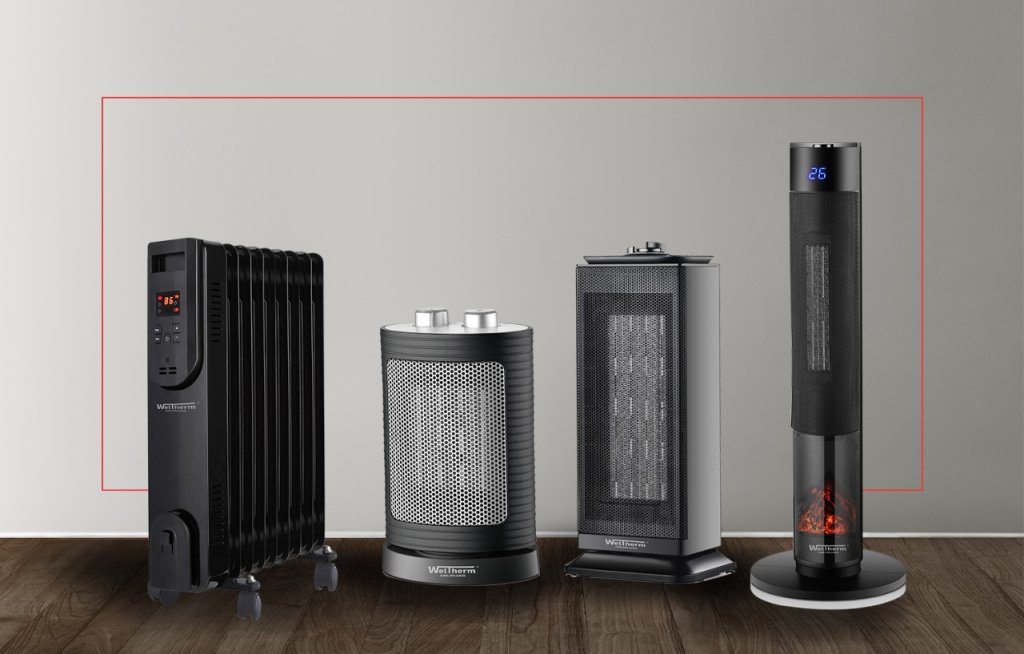With chilly days and colder nights around the corner, selecting the perfect heater becomes not just a comfort but a necessity.
However, choosing the right heater can be a daunting task, with various options available in the market.
The criteria for choosing the ideal heater for your home will mainly depend on the area that requires heating and available storage.
This guide simplifies your decision-making process by comparing oil heaters and electric heaters, helping you find the perfect match for your home’s warmth.
TL;DR
- ⚡ Electric heaters can provide instant heat and are usually very lightweight.
- 🌡️ Newer oil heaters have amazing thermostat technology, providing constant sweet spot temperature.
- ⏳ Oil-filled heaters take around 20 minutes to reach the desired temperature, making them slower to heat up the room compared to electric heaters.
- 🔥 Electric heaters are very fast when it comes to heating the whole room, taking around 5 minutes to heat the entire space, no matter the size.
- 🔌 Electric heaters are cheaper and don’t require a larger upfront investment than oil-filled heaters.
- 🔥 Electric heaters won’t burn you even if you place your hand on them for a couple of hours.
Oil Heater Vs Electric Heater
The main difference between Oil Filled Heater and Electric Heater is that the Oil Heater is more efficient and provides long-lasting heat, and they are very quiet, too, while the Electric Heater can provide instant heat and is very lightweight and portable.
Let us discuss both in detail.
Oil Heaters: Efficient and Steady

Oil Heaters, also known as Oil-Filled Heaters, are very efficient and considered a common form of a convection heater. In this type of heater, the oil is not used as fuel.
They can be stored in the heat reservoir and then heated by an electrical element. The warm oil is helpful in producing long-lasting heat by convection. They are very efficient and very helpful in lowering your electricity bill.
To keep the room temperature consistent, you must use Eco mode, which allows the heater to turn on and off automatically. The Oil-Filled Heaters are great for bathrooms, bedrooms, and living rooms.
Advantages of Oil Heaters
- Efficiency: Oil-filled heaters are more efficient than many electric heaters, consuming less power. This efficiency stems from their operational mechanism. The oil inside these heaters is not a fuel but acts as a heat reservoir. Heated oil circulates within the radiator’s large surface area, quickly warming a significant volume of air. Once the heater reaches its optimal temperature, it stops running, reducing electricity costs.
- Long-Lasting Warmth: With their large surface area and extensive air contact, oil heaters deliver sustained heat. They quickly warm a room and maintain the temperature for an extended period. The heater automatically shuts off at its maximum temperature, enhancing energy efficiency.
- Quiet Operation: Oil-filled heaters operate more quietly than many electric heaters. They lack moving parts, eliminating mechanical noise and do not need to run continuously to maintain heat.
- Low Environmental Impact: These heaters have a minimal environmental footprint due to their low energy consumption. The oil in the heater remains effective for years, reducing waste. However, it is important to note that the oil is a toxic substance and requires proper disposal.
Disadvantages of Oil Heaters
- Slow Heating: Oil heaters warm up more slowly compared to electric heaters. This delay is due to the time taken for the oil to heat up. Heat must transfer from the metal walls to the air, a process that is inherently slow. They also take time to cool down, posing a safety concern around children.
- Weight: These heaters are heavy, making them less portable. Their weight comes from the dense fluid within a metal container, hindering easy movement.
- Inefficiency in Large Spaces: Oil heaters are less effective in larger areas. Distributing heat evenly in spacious rooms or halls is challenging for these heaters.
Electric Heaters: Quick and Convenient

Electric Heaters are considered best for small areas and have the capability to produce heat quickly. They have a heating element which is usually made of metal or ceramic, which helps in quick heating.
There are two types of electric heaters available in the market: one with a fan and one without a fan. The fan variant is helpful in spreading warm air throughout the room more quickly than the fan variant.
Advantages of Electric Heaters
- Rapid Heating: Electric heaters warm up quickly compared to oil-filled heaters, providing warmth within minutes. Many models are equipped with fans to distribute heat faster, making them ideal for immediate heating needs.
- Lightweight and Portable: These heaters are notably lightweight and easy to move. Their portability is a significant advantage for users who need to heat different rooms at different times.
- Oscillation and Directed Heating: Some electric heaters feature oscillation, allowing for even distribution of heat throughout the room. Additionally, they can be directed to focus heat in a specific area.
Disadvantages of Electric Heaters
- Dependence on Power Supply: Electric heaters rely on a constant power source. The heat dissipates quickly once the heater is turned off, as they don’t retain heat like oil-filled heaters.
- Safety Concerns: Electric heaters present several safety risks. They can be a fire hazard if placed near flammable materials and are often hot to the touch. Additionally, as electrical devices, they carry a risk of electric shock.
- Noise: Compared to oil-filled heaters, electric heaters with fans can be noisier due to the operation of the fan.
- Efficiency Concerns: These heaters can lead to higher electricity bills, especially when used for extended periods. Unlike some oil-filled heaters, they may not have an automatic shut-off feature at high temperatures, requiring continuous power to maintain heat.
- Maintenance Needs: Electric heaters, particularly those with fans, require regular maintenance. Dust accumulation on the fan can reduce efficiency and hinder heat distribution. Adhering to the manufacturer’s maintenance guidelines is essential for optimal performance.
Additionally, neglecting maintenance can lead to increased energy consumption and costly repairs, similar to fixing your water heater. Therefore, periodic cleaning and servicing are essential to maintaining your electric heater efficiently and effectively.
Oil Heater vs Electric Heater: Final Verdict
So, there is no best choice at all. It completely depends on the situation because different situations demand different temperatures. If you want a Heater for your Bedroom, then an Oil-Filled Heater is considered best for you because of its silent nature.
It does not create unnecessary noise, which allows the users to sleep peacefully. The other main reason behind choosing the Oil-Filled Heater for the Bedroom is its ability to keep the room warm for a more extended period.
If you are looking for a heater ideal for your kid’s room, then an Electric heater is the best because the Oil Heaters get very hot, which is not safe for children. If you are looking for a Heater for your Basement, then an Oil field is perfect for you because the heat will hang around there for a longer period.
| Oil-Filled Heaters | Electric Heaters | |
| Function | The Oil-Filled Heaters produce heat with the help of a heating element which is generally made up of iron. | The Electric Heater uses continuous electricity to create heat, and that is what they can heat quickly. |
| Efficiency | The Oil-Filled Heater is considered very efficient and helps in providing low electricity bills. | The Electric Heaters require a continuous supply of electricity to run, which can result in high electric bills. |
| Weight | The Oil-Filled Heaters are heavier because they are filled with liquid inside them and metal blocks that are designed to keep any liquid away from escaping. | The Electric Heaters are lightweight and easy to move from one place to another. They have nothing inside them except a fan and some electricity. |
| Noise | The Oil-Filled Heaters do not create any noise at all; they are very quiet because there is no fan inside them, and they do not have to run continuously to provide heat. | The Electric Heater is very noisy because it must run constantly to keep the device hot. |
The choice between oil and electric heaters depends on your specific needs.
Oil heaters are ideal for sustained warmth in bedrooms or small rooms, while electric heaters excel in quickly heating small spaces and offering portability.
Consider your room size, heating duration, and energy efficiency preferences to make the best choice for your home.
Have experiences or questions about heaters? Share them in the comments below!


There is a ton of things wrong with your statistics against electric heaters, you need to do better research based on household use before you post an article. Household wiring can only handle 1500-1750 watts (15-18 amps) and therefore all non-commercial heaters are as such. And most are cheap and pretty quite too. If you were paid by an oil heater company to write this article, just admit it, cause it literally seems like your trying to lie and convince people electric heaters are the devil.
True
I use an oil heater in the garage for my cat. As an outdoors-only cat, she is warm and cozy with her bed next to it. I appreciate the cost savings and that I don’t have to worry about the safety hazards of an electric heater burning the house down as seen in so many news articles these days.
except for all of the ones on 220 and 240V which are 2400 watts and under 🙂
its a big world out there brother.
I feel this is a fantastic comparison. Thank you for posting. I have read so many articles that confirm this, but what I liked best about your article was that you were not trying to sell me anything. And your comment that electric heaters can be safer around children was great to note.
I live in CA where our energy bills are tiered and skyrocketed. I have solar panels on my roof but I’m paying for the installation of those solar panels and from what I should be saving on my electric bills I had hoped to use for paying off the solar panels. Solar does not equate to free energy especially with the soaring rates! I am now interested in trying an oil-filled heater to see the impact on our bills.
Having electric central heating is so expensive now that I’m working remotely. I have to heat the entire house when I’m home in one room.
It is also great to learn that I don’t have to replace (or fill) the oil-filled heaters with oil. I had no idea!!
Thank you!
You said a disadvantage of an electric heater is that it requires a power source however an oil filled heater also requires a power source.
They both need to be plugged in to power in order to heat an element but the oil-filled’s element heats the oil which then tends to hold the heat longer.